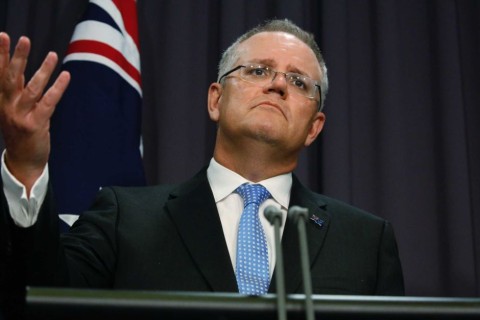
The Federal Government has announced an independent review of the National Disability Insurance Scheme (NDIS) to examine overall costs, value for money and its long-term sustainability.
Treasurer Scott Morrison announced the Productivity Commission review on Friday afternoon with a position paper to be released in May, followed by a report in September.
The review of the $22 billion scheme will consider funding arrangements with states and territories, cost pressures including wages, potential efficiencies and any impact on mainstream services.
The ABC understands the review was expected and consistent with the Heads of Agreement with the states and territories and the Commonwealth, but was brought forward with a broadening of terms.
A quarterly report from the NDIS issued late last year found the scheme was struggling to meet its enrolment targets.
Enrolment in the scheme may eventually be 35 per cent higher than initially expected in the ACT, raising concerns about a shortage of workers and rising costs.
The agency overseeing the scheme, the National Disability Insurance Agency, has called for greater power to control the costs of the scheme.
In late 2015, the Government was warned about a potential cost blowout in the scheme due to the increasing prevalence of autism, workforce and supply shortages and states' shifting health costs.
Documents obtained by the ABC under Freedom of Information Laws showed the National Disability Insurance Agency had urged bureaucrats to remain vigilant about rising costs.
TERMS OF REFERENCE
REVIEW OF NATIONAL DISABILITY INSURANCE SCHEME COSTS
I, Scott Morrison, Treasurer, pursuant to Parts 2 and 4 of the Productivity Commission Act 1998, hereby
request that the Productivity Commission (the Commission) undertake a study into the National Disability
Insurance Scheme (NDIS) costs.
Background
The Heads of Agreement between the Commonwealth and the States and Territories (States) on the NDIS
stated that the Commission would undertake a review of scheme costs in 2017. This review is intended to
inform the final design of the full scheme, prior to its commencement.
Scope of the study
The Commission should address the following issues identified in the Heads of Agreement for the review of
scheme costs:
-
the sustainability of scheme costs;
-
jurisdictional capacity;
-
cost pressures (including wages pressures);
-
changes in the agreed escalation parameters;
-
if efficiencies have been achieved within the scheme;
-
whether there has been any impact on mainstream services; and
-
examine the most appropriate levers to manage any potential cost overruns.
In addressing these issues, the Commission should consider:
-
Commonwealth and State funding and governance arrangements for the NDIS, including financial contributions and risk-sharing;
-
the interaction with, and role of, other services in meeting reasonable and necessary support for people with severe and profound disability; and
-
whether there are any issues with the scheme’s design, including the application of market and insurance principles, in ensuring the best possible outcomes for people with severe and profound disability.
In conducting the analysis, the Commission should take into account its 2011 report into disability care and
support and subsequent agreements between governments for the implementation of the NDIS. The
Commission will be provided with all the data on scheme rollout it considers necessary for the analysis.
Process
The Commission is to consult broadly, including with the Australian, State and Territory Governments.
The Commission will report within eight months of receipt of the terms of reference, or by
15 September 2017, whichever is later.
The Hon Scott Morrison MP
Treasurer
from http://www.abc.net.au/news/2017-01-20/national-disability-insurance-sch…
see also
- http://www.abc.net.au/news/2015-11-05/government-warned-of-cost-blowout… from 2015
- http://www.pc.gov.au/inquiries/current/ndis-costs
- Submission on National Disability Insurance Scheme (NDIS) Costs
Review of the National Disability Insurance Scheme costs
Joint media release with
The Hon. Christian Porter MP
Minister for Social Services
The Government has announced a Productivity Commission review into the National Disability Insurance Scheme costs consistent with the Heads of Agreements with the states and territories and the Commonwealth.
This review is intended to inform the final design of the full scheme, prior to its commencement, by focussing on updating initial cost projections estimated by the Productivity Commission and by providing advice on longer term projections and overall sustainability issues.
The Productivity Commission is due to report to Government within eight months of receipt of the terms of reference.
Public consultation will be undertaken as part of the study and the Government encourages all interested parties to participate. Further information and the terms of reference are available on the Commission's website.
from http://sjm.ministers.treasury.gov.au/media-release/001-2017/
Government to review costs of NDIS
Australian Associated Press
The federal government has announced a review into the costs of the National Disability Insurance Scheme.
The study, to be carried out by the Productivity Commission, will focus on the sustainability of costs, cost pressures and ways to manage any potential cost overruns before the full scheme is rolled out.
The commission is due to report by September.
from http://www.news.com.au/national/breaking-news/government-to-review-cost…;
Scott Morrison launches review of national disability insurance scheme
Productivity Commission to consider scheme’s costs, sustainability and role of other services in meeting disabled people’s needs
 The Productivity Commission will report on its review into the national disability insurance scheme by September 2017. Photograph: Mick Tsikas/AAP
The Productivity Commission will report on its review into the national disability insurance scheme by September 2017. Photograph: Mick Tsikas/AAP
The treasurer, Scott Morrison, has launched a review of the national disability insurance scheme by the Productivity Commission to consider the scheme’s costs and sustainability.
The review will also consider the role of other services in meeting disabled people’s needs, which critics are likely to seize upon as preparing the ground for a possible reduction in the scope of the groundbreaking funding system for disability support services.
Morrison launched the review on Friday, explaining in a statement that it would “inform the final design” of the NDIS including by “updating initial cost projections estimated ... and by providing advice on longer-term projections and overall sustainability issues”.
The commitment to a review in 2017 was part of a heads of agreement between the commonwealth, states and territories. The Productivity Commission will report within eight months.
The terms of reference include consideration of the sustainability of the scheme, jurisdictional capacity, cost pressures (including wage pressures), changes in the agreed escalation parameters and efficiencies that have been achieved in the scheme.
It will also assess “whether there has been any impact on mainstream services” from the introduction of NDIS trials and “the most appropriate levers to manage any potential cost overruns”.
The $22bn disability insurance scheme is currently being trialled in areas including the ACT, the Barwon region in Victoria, the Hunter area in New South Wales and trials for children in Tasmania and South Australia.
But the National Disability Insurance Agency has warned of the potential for cost overruns, as the Productivity Commission originally estimated an average cost of $34,969 but the average cost is actually more than $38,423 a person.
In September the finance department identified possible growth in the number and package costs of clients of the NDIS as one of a number of “significant downside risks” to the federal budget.
The terms of reference say the Productivity Commission should consider:
- commonwealth and state funding and governance arrangements for the NDIS, including financial contributions and risk-sharing
- the interaction with, and role of, other services in meeting reasonable and necessary support for people with severe and profound disability
- whether there are any issues with the scheme’s design, including the application of market and insurance principles, in ensuring the best possible outcomes for people with severe and profound disability.
Concerns have been raised about the NDIS including through a PwC study that reportedly found the scheme may not be ready for the 400,000 additional participants expected by 2019-20 when the scheme is fully operational.
Other reported problems have included estimating only half the number of children in South Australia would be eligible for autism services than is in fact the case.
from https://www.theguardian.com/australia-news/2017/jan/20/scott-morrison-l…
Turnbull government announces review into National Disability Insurance Scheme costs
Adam Gartrell Heath Aston
The costs and sustainability of the National Disability Insurance Scheme will come under scrutiny after the Turnbull government announced the shape of a major review into its future.
Treasurer Scott Morrison said the Productivity Commission inquiry would help shape the final design of the $22 billion scheme - Australia's biggest social policy program since Medicare - which is due to be fully operational and available to nearly 500,000 people by 2019.
Why the NDIS is a big deal
One of the biggest policy reforms in generations is about to change the lives of hundreds of thousands of Australians.
Under an original agreement between the federal and state governments the review was always scheduled to occur in 2017 but the release of its terms of reference come amid warnings the cost of the scheme could blow out by billions of dollars a year.
"This review is intended to inform the final design of the full scheme prior to its commencement by focussing on updating initial cost projections estimated by the Productivity Commission and by providing advice on longer-term projections and overall sustainability issues," Mr Morrison said in a joint statement with Social Services Minister Christian Porter released late Friday afternoon.
The review will look at a range of cost pressures and examine "the most appropriate levers to manage any potential cost overruns".
The commission will undertake public consultation and is due to report back to the government by September.
Labor supports the review but said it should not be used as an excuse to cut costs.
"Labor calls on Malcolm Turnbull to give a guarantee to people with disability and their families that the NDIS won't be cut, capped or delayed," said opposition social services spokeswoman Jenny Macklin.
Australian Federation of Disability Organisations chief executive Ross Joyce welcomed Mr Morrison's announcement, particularly the Productivity Commission's involvement.

"It keeps the review one step removed from those delivering the NDIS and those responsible for it," he said.
Without any change to the cross-government agreement, states like NSW and Victoria must increase their contribution to the NDIS by 3.5 per cent from 2018 and 2019, respectively.
In December, Social Services Minister Christian Porter largely replaced the board of the NDIS, bringing in a number of business heavyweights.
The seven new board members brought a "broader set of skills" than the previous team, Mr Porter said at the time and would guide the $22 billion NDIS from a trial of 30,000-person people to providing services to almost 500,000 people.
Helen Nugent, the chairwoman of Australian Rail Track Corporation, was selected as chairman. Her appointment ended the chairmanship of Bruce Bonyhady.
The NDIS was introduced by the former Labor government but its rollout has been largely managed by the Coalition administrations of Tony Abbott and Malcolm Turnbull.
Last year, Fairfax Media revealed the federal government has spent more than $400,000 on analysing risks and problems with the NDIS.
The Department of Social Services spent $355,000 on a report by PwC Australia into the scheme's IT system that caused widespread disruption to payments when it was introduced in July. A further $66,000 was spent on an independent review by senior public servant Robyn Kruk into the readiness of the NDIS for the transition to full roll out across Australia. The review was distributed to a meeting of state and territory ministers in September but has not been publicly released.
from http://www.theage.com.au/federal-politics/political-news/turnbull-gover…;